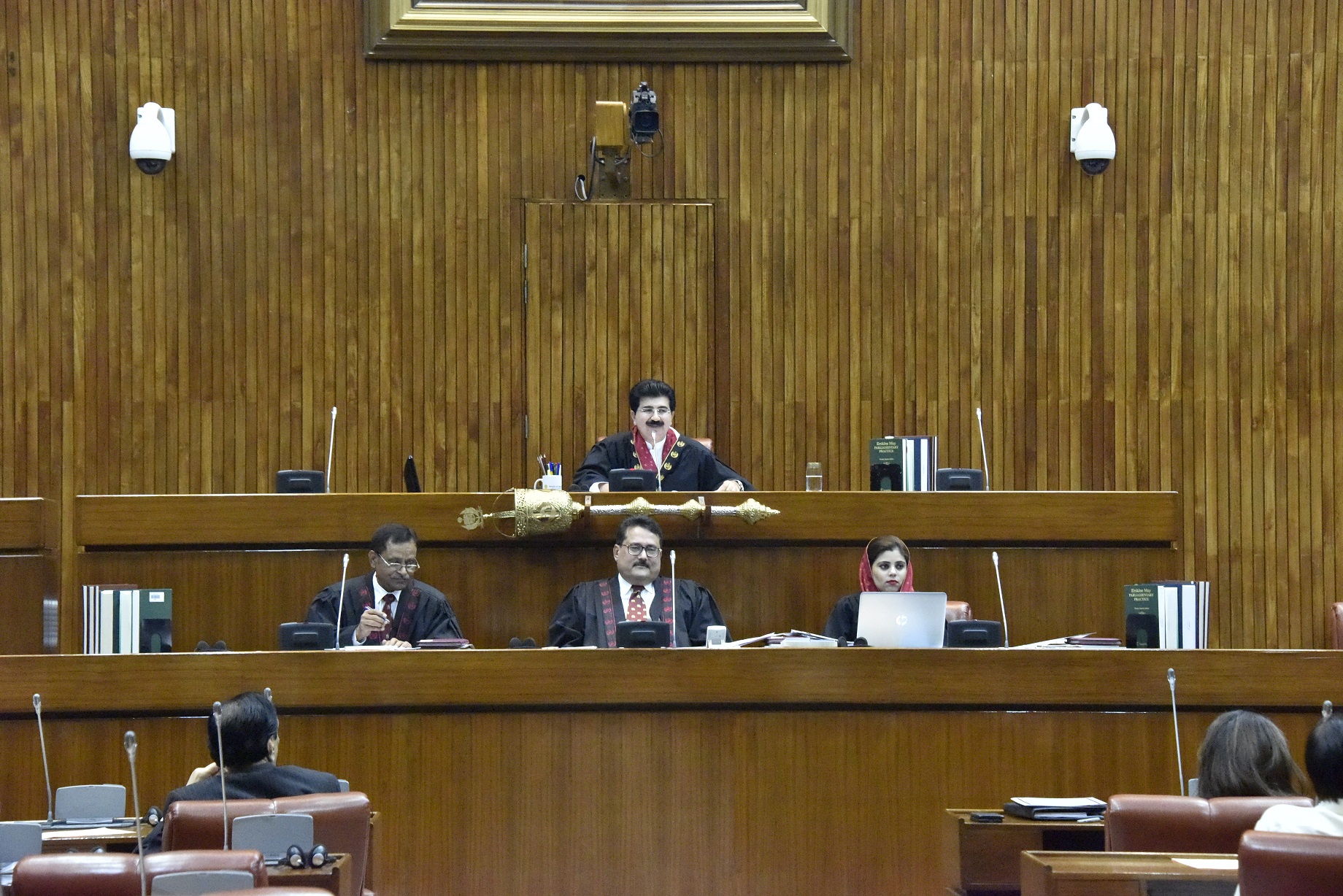Dr Lubna Zaheer
The process of legislating is intricate and time-intensive, with far-reaching effects. Weeks and months of dedicated effort culminate in the preparation of a draft law. The draft is then presented in both the Lower and Upper Houses of Parliament, subsequently undergoing review by the relevant standing committees. The bill is then subjected to debates in both parliamentary chambers and the committees, where potential amendments are proposed. After traversing these stages thoroughly, the bill secures approval. Once endorsed by Parliament, the bill advances to the President. Finally, following the President’s approval, the bill transforms into an Act. In the waning days of its tenure, the PDM government engaged in a flurry of legislative activity. Numerous bills were tabled in both the National Assembly and the Senate. While many bills saw ordinary deliberations, some remained untouched, devoid of any significant discourse.
Take note of the scenario in which the field of higher education becomes a focal point of interest for members of parliament and politicians. This interest is evidenced as a considerable number of bills related to private universities-around three dozen, more or less, were introduced amidst this dynamic backdrop. Members of parliament affiliated with different parties have acknowledged in the media that they couldn’t find time to read or review the proposed drafts of multiple bills presented simultaneously due to tight schedules. PDM government also had to face swift and strong criticism from the media for this hasty legislation and, undoubtedly, such situations necessitate critical examination. After the dissolution of the assembly, President Arif Alvi returned many bills, which were sent to the Presidency for approval, without signing them. Bills that cannot obtain the President’s approval will lapse. Alternatively, after the general elections when a new assembly will emerge, anyone intrigued might attempt to gain approval for these returned bills.
When on one side media kept highlighting the hasty and uncontroversial legislation, on the other side, a narrative of a lost bill also remained under discussion. This is the story of a bill proposed by Senator Irfan Siddiqui, which has been missing for the past 14 months. This bill encompasses an intricately nuanced backdrop. During the government of Pakistan Tehreek-e-Insaf, in July 2019, Mr. Siddiqui was apprehended based on the pretext of a tenancy law. This arrest took place during the nighttime hours and he was lodged in the Adiala Jail (قصوری چکی). Qasoori Chakki is a cell in Jail wherein criminals and terrorists are kept. The following day, Siddiqui was presented handcuffed before the lady Assistant Commissioner. She exercised the powers of a judicial magistrate under the British-era criminal law and sent Mr. Siddiqui to jail on a 14-day remand.
In the British era, administrative officers also had judicial powers; however, according to the Constitution of Pakistan, the administration and the judiciary have separate powers. In the beginning, English law was practiced in Pakistan and the bureaucratic officials continued to exercise high judicial powers. Subsequently, all four provinces enacted legislation in this regard and this way the judicial powers of deputy commissioners and assistant commissioners were rescinded. However, in Islamabad, this law from the British era still holds its ground. Under this, Mr. Siddiqui was arrested and placed in the Qaroori Chakki (قصوری چکی). Senator Irfan Siddiqui, after consulting with senators from various other parties, introduced a bill in the Senate.
The sole purpose of the Bill was to prevent administrative officers from exercising the powers of the judiciary. This bill was brought to the Upper House, and the Senate’s Standing Committee on Interior Affairs deliberated upon it. After being passed by the Senate, the bill was sent to the National Assembly where it was unanimously approved. According to regulations, it had to be sent to the Senate by the Prime Minister’s House, following which it was to reach the President’s House. However, after its approval by the National Assembly, the bill seemed to have vanished without a trace. There’s no news about its current whereabouts – which office, which file it’s hidden away in? When the Senator raised his voice against this injustice, spokesperson of President House promptly clarified that they had not received this bill at all. So now we’re left wondering: Where did this bill vanish to? Who pulled the strings for this vanishing act?
In recent days, the Parliament passed the bill on contempt of Parliament. In this context, both Parliament and its standing committees hold the authority that if a government official, the head of an institution, or another relevant individual, doesn’t show up when summoned, they could face a punishment of six months in jail and/or a fine of one million rupees under the Parliamentary Contempt law. It gives idea that how much Parliament values its dignity and respect. Without a doubt, Parliament is the most important and significant institution and it should also be respected and held in high regard.
The question arises, if a bill is approved by both the Senate and the National Assembly, but after being sent to the President for his signature, it somehow gets lost along the way, wouldn’t that be considered contempt of Parliament? As the Senate has already clarified that it has not received this proposed bill. If that’s the case, shouldn’t the National Assembly seek an explanation from its secretariat about the whereabouts of the approved bill? Despite the dissolution of the Assembly, the Speaker of the National Assembly continues to hold office.
Mr. Siddiqui had sent a letter to the Speaker, urging an inquiry into this matter, but there has been no progress on this issue so far. It is crucial that the Speaker of the National Assembly takes this matter seriously. This concerns the dignity of Parliament and its credibility. The disappearance of a bill approved by Parliament for fourteen months is no ordinary incident. It is tantamount to disrespecting a vital institution like Parliament. Let’s see how the Speaker of the National Assembly responds to this disrespect towards Parliament.
— The author is an academician and political analyst
Disclaimer: The views expressed in this article are those of the author and do not necessarily reflect the official policy or position of Lahore Mirror



